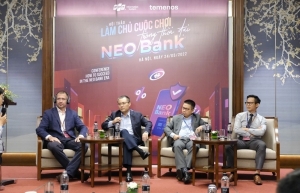AI spotlight here to stay
 |
| Swapnil Deshmukh, regional director, Infinity Digital Banking, Temenos Asia-Pacific (left), and Dao Luu Xuan, country director, Temenos Vietnam (right) |
The global banking industry was buffeted by challenging macroeconomic headwinds in 2023, and a keen focus on resilience and innovation from retail banks is anticipated in response as Vietnamese banks prepare to usher in the Year of the Dragon. At the beginning of 2024, some hot trends could leave behind a lasting impact on the Vietnamese banking sector.
As digital transformation becomes a key priority as part of the 13th National Party Congress’ 10-year socioeconomic development strategy, with the national digital transformation initiative towards 2025 and beyond approved, Vietnamese banks ride on the awakening force of innovation towards parity with digital banks across the globe.
The three key trends of payments, AI, and environmental, social, and governance (ESG) could be instrumental in accelerating their journey. In Vietnam, Samsung Pay was launched in 2017 and Google Wallet in November 2022. In 2023, Vietnam was the third country in Southeast Asia to allow Apple Pay after Malaysia and Singapore.
At the same time, the Vietnamese government has extended the pilot use of telecom payment accounts for small-value goods and services until the end of 2024. Vietnam started the two-year service pilot nationwide in March 2021. The service allows customers to use their telecom accounts to conduct various transactions, including payment for small-value goods and services, money transfer, direct deposit, and withdrawal at outlets and transaction points of telecom providers throughout the country, without requiring a bank account, a smartphone, or an internet connection.
The Vietnamese government aims to reduce cash payments to 8 per cent by 2025. This presents a massive opportunity for banks to improve their fee income by providing channel-agnostic payment solutions to their customers and merchants as part of their digital channel offerings.
Last year, generative AI came into the spotlight globally. In a recent global study jointly published by Economist Impact Research and Temenos, showed as much as 75 per cent of the respondents expect generative AI to impact banking, and more than 70 per cent of survey respondents see unlocking value from AI as a critical differentiator for banks heading into the future.
Vietnam is in an excellent position to seize the moment to utilise AI to enhance the payment experience for both consumers and businesses due to its status as the fastest-growing digital economy in Southeast Asia for the second year running.
The country’s digital economy is expected to grow at a compound annual growth rate of 20 per cent. Banks and financial institutions can navigate a competitive market landscape in the financial services industry by using AI to acquire more customers, enhance customer engagement, and optimise operational excellence. AI facilitates quicker credit assessment for consumers and businesses, enabling more reliable and straightforward underwriting and collections.
The technology can also expedite fraud detection and protection, improve dispute management processes, and automate financial advisory services. This leads to a better user experience and provides intelligent financial services, such as hyper-personalised recommendations and offers.
Vietnam is one of the countries most likely to be affected by climate change, with an estimated loss of $523 billion, equivalent to 14.5 per cent of GDP by 2050. Therefore, building green finance will play a vital role in sustainable development.
The Economist Impact Research study also reveals that customer centricity is driving banks to offer more embedded ESG propositions to their customers (73 per cent), as well as providing capital to environmentally friendly projects (74 per cent). These statistics allude to the emerging market opportunities in this space and potential benefits to companies.
In tandem with this global development, Vietnam also launched an investment framework to finance its transition to a low-carbon economy. As per a PwC report, 88 per cent of companies surveyed in the financial sector have made or plan to make ESG commitments. To rise to the challenge, financial institutions must develop holistic action plans that can address the various scopes required to integrate ESG understanding into all aspects of the organisation. Doing so will help them accelerate their journey.
As the Asia-Pacific region navigates into a period of lower inflation and lower interest rates, the Asian Development Bank is forecasting GDP growth of 6 per cent in 2024 for Vietnam, more than double that of the global economy. With the right perspectives and partnerships, Vietnamese banks are well-positioned to capture the opportunities available in the Year of the Dragon, and the aspirational digital transformation by 2030 could happen earlier than anticipated.
Temenos is a champion of innovation, and partners with some of the leading banks across ASEAN to push the boundaries of what technology can do for banking and building tomorrow’s banks.
 | Digital strategy for banks to lead the game in neobank era The development of fintech companies and the emergence of neobanks have been creating a fierce race in the banking and finance industry. FPT IS and Temenos have recently discussed optimal approaches with the banking industry's leaders about how to lead the race. |
 | The future of banking discussed at Temenos forum The 2023 Temenos Regional Forum was held on August 23 and played host to banking experts as they shared their views on digital transformation and the future of banking, where the customer is at the centre of new technology. |
 | LPBank partners with Temenos to drive next-gen banking solutions The Vietnam-based LPBank is bolstering its commitment to innovation by entering a strategic partnership with Temenos Group, a provider of banking solutions based in Switzerland. |
What the stars mean:
★ Poor ★ ★ Promising ★★★ Good ★★★★ Very good ★★★★★ Exceptional
 Tag:
Tag:
Related Contents
Latest News
More News
- Private capital funds as cornerstone of IFC plans (February 20, 2026 | 14:38)
- Priorities for building credibility and momentum within Vietnamese IFCs (February 20, 2026 | 14:29)
- How Hong Kong can bridge critical financial centre gaps (February 20, 2026 | 14:22)
- All global experiences useful for Vietnam’s international financial hub (February 20, 2026 | 14:16)
- Raised ties reaffirm strategic trust (February 20, 2026 | 14:06)
- Sustained growth can translate into income gains (February 19, 2026 | 18:55)
- The vision to maintain a stable monetary policy (February 19, 2026 | 08:50)
- Banking sector faces data governance hurdles in AI transition (February 19, 2026 | 08:00)
- AI leading to shift in banking roles (February 18, 2026 | 19:54)
- Digital banking enters season of transformation (February 16, 2026 | 09:00)


























 Mobile Version
Mobile Version